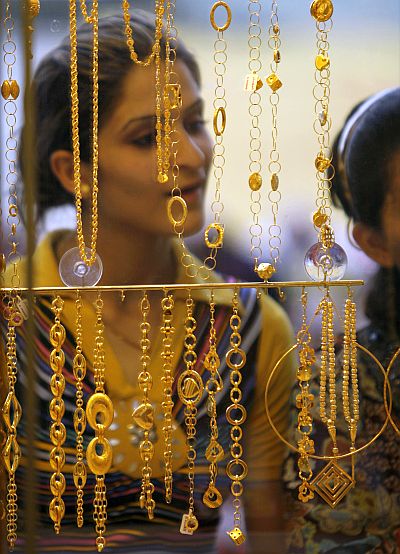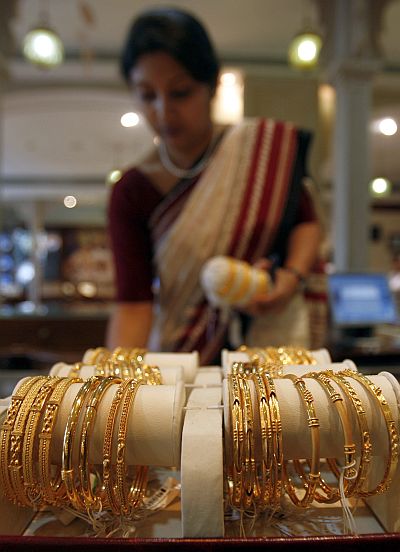Photographs: Reuters Jan Harvey and Siddesh Mayenkar in Rome and Mumbai
Indian jewellers, long spoiled by access to the world's largest group of gold consumers, must seek expansion overseas after the authorities tied gold imports to exports. But the path will not be easy.
India has hiked import duty for gold, its biggest non-essential import, this year from 4 per cent to 10 percent - 15 percent in the case of jewellery - in a bid to cut imports and close its record current account deficit.
It has also linked imports to export volumes - at least 20 per cent of bullion imported must now be exported.
Pressure on the industry to increase gold exports is helping to push Indian jewellers towards overseas markets.
…
Jewellers suffer as India tries to curb gold imports
Photographs: Reuters
"Just to secure domestic supplies, (jewellers) have to export," Mayank Khemka, managing director of jewellery wholesaler Khemka Group, said on the sidelines of the London Bullion Market Association conference in Rome.
For his company, Dubai, Hong Kong and Singapore will be the primary markets to target, he said.
C.K. Venkataraman, chief executive of the jewellery division of Titan Company Ltd, told Reuters at the conference that his company was looking at building up its exports as a part of its long-term growth strategy, targeting in particular Indian consumers living overseas.
"I don't think India has ever looked globally for gold jewellery sales," he said. "Over the next decade, we should expect that to change."
…
Jewellers suffer as India tries to curb gold imports
Photographs: Reuters
But for all jewellers may want to sell overseas, the path to boosting exports is unlikely to be smooth.
Exports have dropped 60 per cent between April and August this year as confusion over the new regulations, tough competition from other manufacturers like Thailand, and slack demand from major consumer the United States led to a virtual suspension of imports into India.
The country is historically the world's biggest consumer of gold, with imports hitting 850 tonnes last year. Only 8 per cent of that was exported.
Indian jewellers face tough competition from lower-cost producers, and will have to sharpen their design and manufacturing skills to move away from the heavy, yellow-gold pieces popular in India but less marketable overseas.
"Our machine-made products have been facing huge competition from Thailand, Malaysia and Indonesia, and since we were unable to export in the last five weeks, our image has been hit in the international market," Konal Doshi, partner at Modern Impex, a gold jewellery exporter said.
…
Jewellers suffer as India tries to curb gold imports
Photographs: Reuters
Supply tightness due to the import restrictions has made jewellers unwilling to ship material.
In addition, jewellers unused to selling outside their own borders will have to familiarise themselves with export procedures and build up relationships with overseas retailers to the point where they are willing, for example, to send expensive samples overseas for approval.
"Exporting isn't something that can be started overnight, Khemka said. "You need to give people time."
Incentives for Exporters
Pankaj Kumar Parekh, vice chairman of the Gem & Jewellery Export Promotion Council, said the jewellery industry has already met the Reserve Bank of India to push them to include the jewellery industry in its interest rate scheme, which facilitates loans at below normal lending rates.
…
Jewellers suffer as India tries to curb gold imports
Photographs: Reuters
The commerce ministry is expected to announce financial incentives for jewellery exporters by end-October.
At present, the disruption to imports caused by the new import duty regime - shipments of gold into India have been virtually halted for two months pending clarification of the new rules - is stalling potential jeweller forays into exporting.
"We saw a huge decline in exports as shipments of coins and medallions, which used to contribute to a lot of exports, were stopped. Prices of gold also dropped from last year, and the third reason was unavailability of gold," Konal Doshi said.
"There were no agencies doing imports in the last five weeks, so how do you expect anyone to export?"
Once that situation is alleviated, jewellers will likely get things moving again, he said.
"In a week's time imports should start all across the country. By the end of October things would be in motion," said Doshi, adding "Orders for supplies for the peak US season are already with us, and it is looking promising." Doshi declined to give any details on his US orders.
…
Jewellers suffer as India tries to curb gold imports
Photographs: Reuters
Estimating 40 tonnes of exports for the six months to March could leave the domestic market with 160 tonnes of gold in the peak festival and wedding season, about half its requirement, Parekh said.
India has already imported 393.68 tonnes of gold from April to September 25, and the finance ministry expects 750-800 tonnes of gold imports in the fiscal year to March 2014.
Shekhar Bhandari, executive vice president at Kotak Mahindra bank in Mumbai, said he believes the jewellery industry in India has the tools and the will to boost its export activity.
"Many people are moving towards exports... The jewellery industry is ready to do that now," he said. "Until now, they felt there was easy money in imports. But when you realise you have limited room (to grow), you will take those steps."
(Additional reporting by A. Ananthalakshmi in Singapore; editing by Keiron Henderson)








article